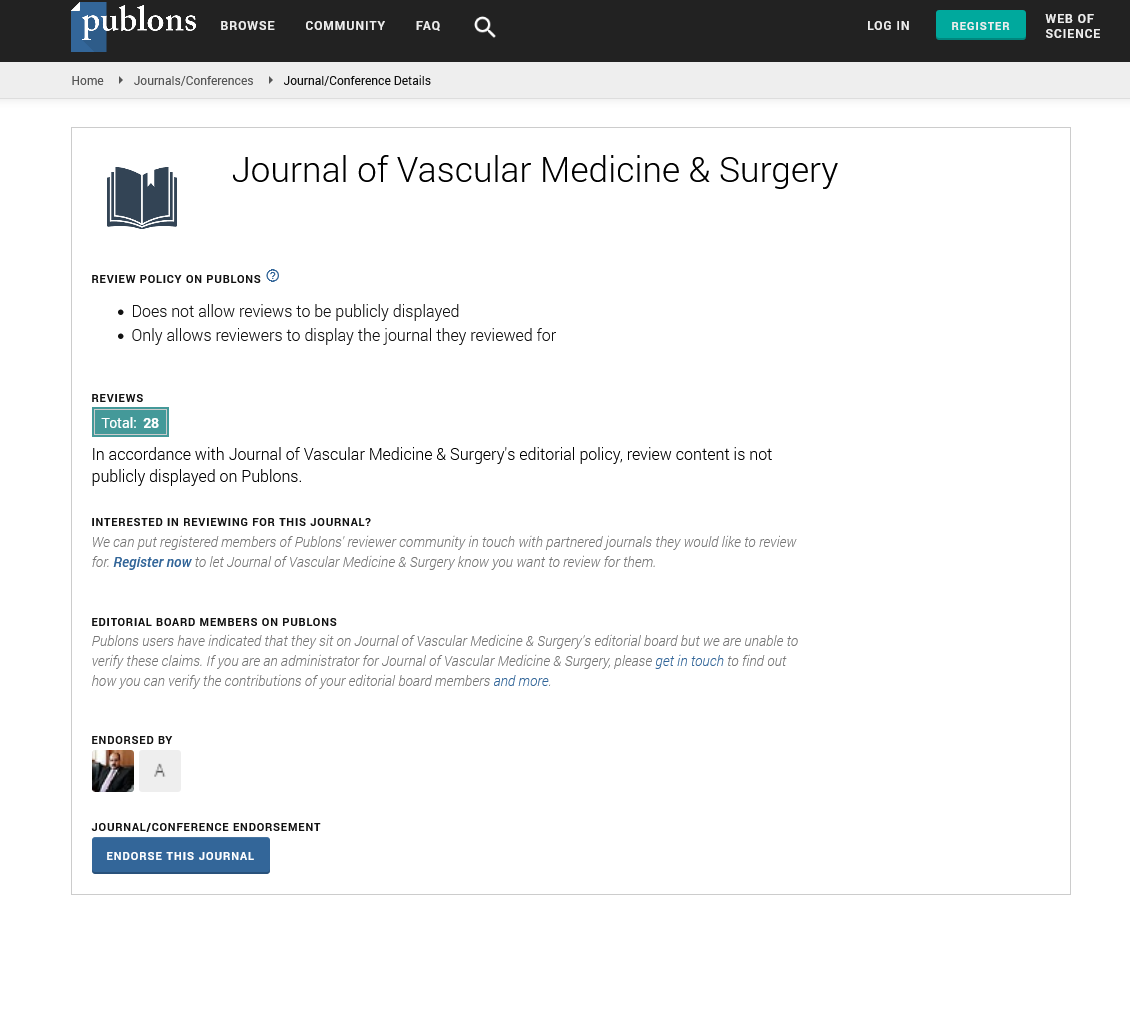Indexed In
- Open J Gate
- Academic Keys
- RefSeek
- Hamdard University
- EBSCO A-Z
- OCLC- WorldCat
- Publons
- Euro Pub
- Google Scholar
- SHERPA ROMEO
Useful Links
Share This Page
Journal Flyer

Open Access Journals
- Agri and Aquaculture
- Biochemistry
- Bioinformatics & Systems Biology
- Business & Management
- Chemistry
- Clinical Sciences
- Engineering
- Food & Nutrition
- General Science
- Genetics & Molecular Biology
- Immunology & Microbiology
- Medical Sciences
- Neuroscience & Psychology
- Nursing & Health Care
- Pharmaceutical Sciences
Perspective - (2023) Volume 11, Issue 1
Describing the Antiplatelet Medication's Impact on Patient's with Ischemic Stroke Severity
Joseph Henry*Received: 02-Jan-2023, Manuscript No. JVMS-23-19838; Editor assigned: 05-Jan-2023, Pre QC No. JVMS-23-19838 (PQ); Reviewed: 23-Jan-2023, QC No. JVMS-23-19838; Revised: 30-Jan-2023, Manuscript No. JVMS-23-19838 (R); Published: 06-Feb-2023, DOI: 10.35248/2329-6925.23.11.500
Description
Antiplatelet medications have been shown to be useful in the secondary prevention of ischemic stroke. In particular individuals with cerebral thrombosis and a history of stroke, discovery of the prior antiplatelet therapy was associated with a decrease in stroke severity. Even if patients who have had a stroke encounter a later thrombotic infarction, antiplatelet medications may decrease the amount and breadth of thromboses. Similar to anticoagulant drugs, antiplatelet drugs are thought to lessen the severity of strokes as well as the risk of ischemic stroke. However, a number of researches have presented contradictory findings. The greatest data came from the International Stroke Trial, where aspirin use in the past was linked to somewhat more severe strokes, however this link was not statistically significant after controlling for confounding variables. There were disparities in the demographic information between antiplatelet users and non-users in those negative reports. Antiplatelet users are typically older and have more vascular risk factors, such as atrial fibrillation and comorbidities, than non-users. The severity and premorbid disability at the beginning of the second stroke can be significantly influenced by the first stroke. Some studies have only included strokes that were the first stroke in order to prevent this bias, although the results have generated debate. On the other hand, people with a history of stroke have not been the subject of many studies. Two older trials that looked at secondary stroke prevention showed a protective impact of antiplatelet medications on the severity of later stroke in patients who had previously experienced TIAs. In a different trial, pretreatment with antiplatelet drugs lessens the severity of stroke in people who have never had a stroke or TIA, but not in people who have. However, no study of patients with a prior history of just stroke was offered in those trials.
Additionally, there has been an imbalance in stroke subtypes between people using antiplatelet therapy and those who have not.
Previous studies found that stroke patients who had previously received antiplatelet therapy had a considerably higher incidence of cardio embolism, the most severe subtype of ischemic stroke.
Antiplatelet agents are advised for non-cardio embolic strokes such LAA, SVO, and BAD while anticoagulant medications are superior to antiplatelet agents in the prevention of cardio embolism. Antiplatelet therapy is anticipated to reduce thrombus size because it suppresses enhanced platelet activity, which is the primary cause of arterial thrombus development.
Some researchers have used multivariate analysis, particularly when employing propensity score matching, to overcome an imbalance of clinical background between patients with and without antiplatelet treatment. Once more, there has never been a study that focused on individuals who had had a previous stroke, or secondary stroke prevention. As a result, we concentrated on secondary stroke prevention by only including patients with a history of stroke and eliminating individuals who had previously used anticoagulant medications or who had cardio embolism. Any significant imbalance between those who have used antiplatelet medications in the past and those who haven't, with the exception of dyslipidemia, may be eliminated by limiting inclusion to patients with a history of stroke and cerebral thrombosis. It may also improve the impact of prior antiplatelet medication use at the time of a second stroke. The study has a number of restrictions. First of all, this study was a retrospective observational study that included a limited sample of patients from a single center.
A sizable, multi-center, prospective investigation should be conducted to corroborate the findings. Second, a previous stroke could have been hemorrhagic. Only a prospective research could assess the risk of bleeding. Third, it took a while from the onset of symptoms to admission because, even in patients on antiplatelet medication, some forms of stroke could worsen for hours or days after they first occurred. Fourthly, there was no information on treatment resistance, which some patients with recurrent cerebral thrombosis may develop.
Citation: Henry J (2023) Describing the Antiplatelet Medication’s Impact on Patient’s with Ischemic Stroke Severity. J Vasc Surg. 11:500.
Copyright: © 2023 Henry J. This is an open access article distributed under the terms of the Creative Commons Attribution License, which permits unrestricted use, distribution, and reproduction in any medium, provided the original author and source are credited.

